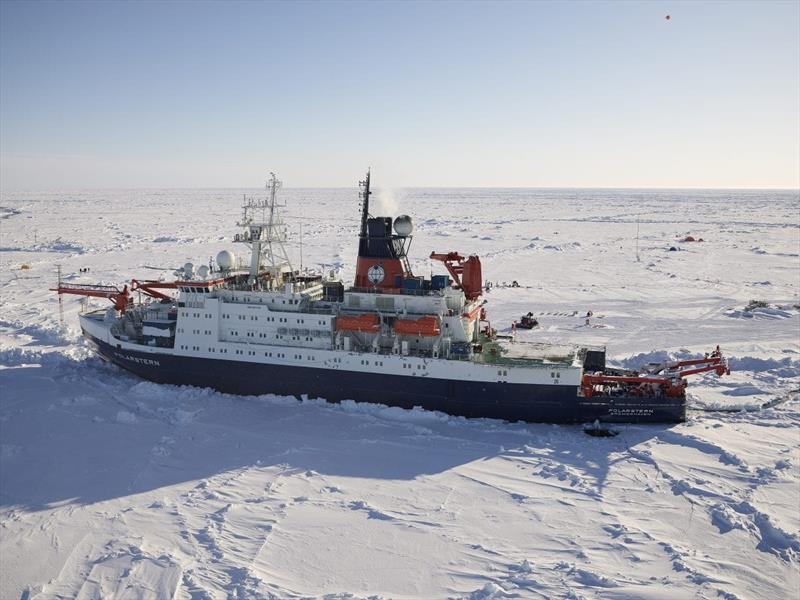
Epic Arctic mission ends
by The Woods Hole Oceanographic Institution 17 Oct 2020 13:56 BST

German icebreaker Polarstern returned home after a year spent drifting through the Arctic Ocean during the largest polar expedition in history © Michael Gutsche, Alfred Wegener Institute
International climate research project marked by scientific surprises, logistical challenges
The German icebreaker Polarstern returned to its home port Oct. 12, 2020, after being frozen near the top of the world for nearly a year. The ship carried an international team of researchers—who joined and exited the ship in phases throughout the expedition—as part of the Multidisciplinary Drifting Observatory for the Study of Arctic Climate, or MOSAiC program, to study all aspects of the Arctic system.
The team, which included Woods Hole Oceanographic Institution (WHOI) biological oceanographer Carin Ashjian, collected petabytes of data describing the ocean, the ice, and the atmosphere.
"We've got so many samples, they won't be processed for months," says Ashjian, chair of the biology department at WHOI, whose focus during MOSAiC was on the seasonal dynamics of copepods: tiny crustaceans that play a critical part of the carbon cycle.
Copepods, which many larger animals rely on for food, matter enormously to the future of Arctic ecosystems, says Ashjian. "If you want to know what's going to happen to polar bears, well, to have polar bears you have to have seals. To have seals, you have to have fish. To have fish, you need copepods," she adds.
Speaking more than a dozen different languages, the research team worked toward the same goal: to better understand how dwindling sea ice influences the region's climate system and how those changes ripple around the world.
"We knew the ice was thinning, but it was still far more dynamic than we thought," says University of Colorado Boulder scientist Matthew Shupe, co-coordinator of the international Arctic mission. "It surprised us. The unpredictability of the Arctic is one of its characteristics right now. And we were right there in the middle of a manifestation of that."
During the epic expedition, the sea ice moved more than expected, cracking in fractures that opened into leads hundreds of miles long, then closing, ridging, and generally creating a messy, rough icescape. Jennifer Hutchings, a sea ice expert from Oregon State University, says she's barely begun to dig into her data, but it's clear she and her colleagues will get new insight into the tricky physical dynamics of how sea ice fractures under the forces of wind and ocean motion.
That's significant, she says, because "sea ice is one of the most important components of the Arctic climate system. It modulates the 'talking' between the ocean and the atmosphere."
The National Science Foundation was the lead U.S. funder of MOSAiC, supporting dozens of researchers with about $27 million, putting it among the largest Arctic research initiatives the agency has ever mounted. The Department of Energy was the first U.S. agency to commit to the research mission, investing nearly $10 million and providing the largest suite of atmospheric instruments. All MOSAiC data will soon be available for free to researchers around the world; some measurements, such as from DOE's Atmospheric Radiation Measurement (ARM) user facility, are already accessible.
"Direct observations and physical samples collected during the MOSAiC expedition represent a quantum leap in our understanding of natural processes and cycles in the central Arctic Ocean across all seasons," said Frank Rack, NSF's Arctic Research Support and Logistics Manager. Winter measurements are especially valuable because they're so rare, Rack said, and MOSAiC data will "aid in the development of improved models, forecasts and future predictions."
Data sets that researchers imagined would be continuous for the entire year do have some gaps. Polar bears occasionally disrupted research on the ice, delaying instrument repairs or atmospheric balloon launches. An Arctic fox chewed through data cables and storms broke up scientific "cities" on the ice that required relocation or repair. Most significantly, the ship had to leave the ice for about a month this spring, to exchange staff while responding to the challenges of the global coronavirus pandemic.
Some systems remained on or below the ice, autonomously collecting data. Other projects paused briefly. "We lost all our June data," said Jeff Bowman, an ecologist and oceanographer at the Scripps Institution of Oceanography, University of California San Diego. "But considering the global disruptions, we were extremely fortunate that MOSAiC could continue. Despite the hole, when all is said and done, it will still be an astonishing collection of data."
For more information, please visit www.whoi.edu.